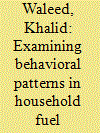| Srl | Item |
| 1 |
ID:
177147


|
|
|
|
|
| Summary/Abstract |
Prime objective of this study is to analyze fuel consumption patterns at national as well as at provincial level for Pakistan. Dynamic patterns in household fuel choices have been examined under Two-Stage Budgeting Framework through Quadratic Approximation of Almost Ideal Demand System (QUAIDS) using HIES data for year 2015–16 to obtain reliable estimates of Price and Budget Elasticities. Quadratic Engel estimates reflect households’ energy expenditures allocation decisions while the Probit estimates explore how alternate fuels are chosen by households for consumption? The Engel estimates highlight that the share of fuel expenditures in total household expenditures is higher in rural areas than in urban areas. The computed compensated price elasticities suggest that Firewood and Kerosene are relatively more price inelastic in rural areas as compared to the urban areas. Furthermore, our estimates also indicate that cleaner fuels are more price inelastic in urban areas than in rural areas with inter-provincial variations in computed elasticities. These estimates can be used as an effective policy making tool for transition towards cleaner fuels, energy policy simulations, to evaluate taxation and subsidy frameworks and energy system forecasting to prevent environmental degradation.
|
|
|
|
|
|
|
|
|
|
|
|
|
|
|
|
| 2 |
ID:
177443


|
|
|
|
|
| Summary/Abstract |
The price elasticities demand of electricity, gas, oil fuel, gasoline and steam coal are estimated using household surveys from 1992 to 2014. The analysis uses alternative econometric techniques – OLS, SURE, and Quadratic Almost Ideal Demand System (QUAIDS) – the last of which is based on the methodology of Banks, Blundell and Lewbel considering socioeconomic characteristics of the households to account for the difference in demand of energy related goods. It is found that the demands for fuels are price inelastic, and the differences in elasticities between poor and non-poor households are small but statically significant. The income elasticity of demand is generally found to be positive and higher in absolute value than price elasticity, and the differences are greater between poor and non-poor. Consequently, there would be a differentiated reaction of consumers to changes in energy prices according to their poverty status. Steam coal and firewood, each of which could be considered inferior goods, stand as counterexamples in that the income elasticity is found to be negative. The contribution of this study helps policy makers to analyze household welfare when applying changes in energy prices in the face of fiscal and/or energy reforms, such as those Mexico is implementing.
|
|
|
|
|
|
|
|
|
|
|
|
|
|
|
|